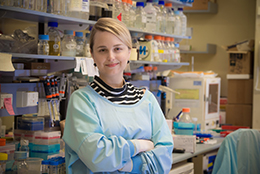10 March 2016
 Dr Sophie Wiszniak is an exceptional scientific researcher. Winning one of the increasingly competitive early career fellowships is proof of her talent but as Sophie will attest there are many other talented female researchers who struggle to fund their research.
Dr Sophie Wiszniak is an exceptional scientific researcher. Winning one of the increasingly competitive early career fellowships is proof of her talent but as Sophie will attest there are many other talented female researchers who struggle to fund their research.
A post-doctoral researcher in the Neurovascular Research Laboratory at the Centre for Cancer Biology - an alliance between the University of South Australia and SA Pathology – Sophie just secured the 2016 Mary Overton Early Career Fellowship, established to encourage a person of outstanding ability to make biomedical research a career.
Fellowships are rare opportunities and Sophie’s will fund important research into a type of embryonic stem cell that can be responsible for congenital heart defects, something she believes is not being considered anywhere else.
Sophie's hope is that" her research will ultimately give people more information about what contributes to congenital heart defects, and what chance affected individuals may have of passing on these defects to their children.
“Genetic heart defects are relatively common and to have any hope of understanding how they occur in humans we need to understand how the heart develops normally,” Sophie says.
“I’ll be working on a specific set of cells – neural crest cells – they are embryonic and form in the neural tube.
"At the moment, globally we are the only ones looking at how neural crest cells affect heart development.
“In the past this area has had some attention, but right now we feel that we are in a niche area where we have the expertise and the tools to discover more about this important health issue.
“We have a competitive advantage and the Mary Overton Fellowship provides the opportunity to take some strides forward in this area.
“I was also recently awarded one of the Channel 7 Children’s Research Foundation Grants so these pieces of funding mean I can support my own research and move towards transitioning from being a post-doctoral researcher who works with other people to directing my own research and having my own research team.”
Establishing a career in scientific research is hard work and with increasing competition and reduced funding options, the career advancement journey has many roadblocks – especially for women scientists.
According to the Australian Academy of Science, while women comprise more than half of science PhD graduates and early career researchers, they make up just 17 per cent of senior academics in Australian universities and research institutes.
Encouraging more women into science is important but Sophie believes, securing the funding to keep them there is the bigger challenge.
“Once you have completed your PhD your job for the next five years is pretty much just publishing papers as often as you can so that you can build up your CV and apply for funding grants,” Sophie says.
“The struggle is to ensure that your research output is significant in volume but also of very high international standard and that is a hard balance to achieve.
“I managed to juggle those priorities with lots of hard work, clear direction about where I want to take my research and great support from my Laboratory Head Quenten Schwarz.
“Without grants and fellowships you can’t think more than twelve months ahead because you just never know where the money to support your research is going to come from.”
CCB’s Neurovascular Research Laboratory Head, Dr Quenten Schwarz, says Sophie’s Fellowship is great recognition and provides an excellent opportunity for Sophie and the lab to deliver some unique research.
“This Fellowship is lovely reward for all of Sophie’s hard work over the past five years with the CCB and it gives her and the lab a little more flexibility and stability,” Dr Schwarz says.
“Scientific research is a highly competitive field so having three years of funding means a researcher like Sophie can explore new things, take on bigger picture projects and then move these projects to the next level and maybe explore therapeutic outcomes and relevance to diseases that we haven’t been able to in the past.
“There is just no doubting the career value of a Fellowship for the individual, but what people underestimate is how much difference that funding can make to a research team's goal of helping to develop life changing cures and treatments."
Centre for Cancer Biology
The Centre for Cancer Biology carries out a world-class program of innovative research, making breakthrough discoveries in the fundamental causes of cancer, and translating these discoveries into new ways to prevent and treat the disease. Established in partnership with SA Pathology and now embarking on a significant cooperative partnership with the University of South Australia, our laboratories carry out research in the areas of gene regulation, molecular signaling, disease-specific research, translational oncology and cancer genomics. The CCB is a member of the Association of Australian Medical Research Institutes (AAMRI)
Media contact: Katrina McLachlan office +61 883020961 mob 0414972537 email katrina.mclachlan@unisa.edu.au




